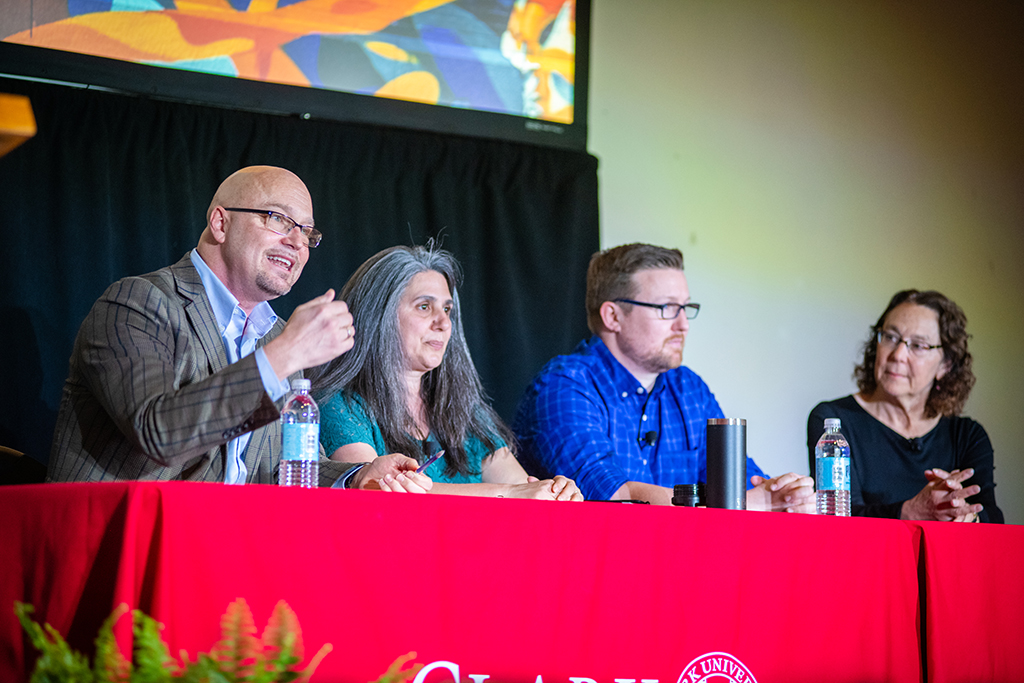INAUGURATION ACADEMIC SYMPOSIUM – APRIL 29, 2022
Symposium session addresses Clark’s impact in the community

In the session titled “Connections and Impact: Clark in the Community,” Shelly Tenenbaum, professor of sociology, Donald Spratt, associate professor of chemistry and biochemistry, Eric DeMeulenaere, associate professor of education, and Laurie Ross, associate dean of the faculty and professor in the International Development, Community, and Environment Department shared ways in which they engage in community-based service and action in prisons, in local schools, and in partnership with area organizations. Part of the Academic Symposium, one of the events held to celebrate the Inauguration of President David B. Fithian, the April 29 hour-long discussion consisted of individual panel presentations, followed by a lively Q&A with the audience.
DeMeulenaere kicked off the program by reminding the audience, “Clark’s motto is ‘challenge convention, change our world.’ You can’t change the world unless you’re engaged with it.” He spoke of eye-opening experiences that some of his Clark students had while working with local youth who faced the threat of gang violence on streets not far from campus.
Ross described her work gathering and analyzing data that relates to youth violence prevention and the importance of viewing data in the appropriate context. “Understanding the politics around the data really matters,” she said. Ross also emphasized the importance of not speaking for community members because they can represent their own stories and perspectives.
Even the COVID pandemic could not slow Spratt down in his efforts to reach local high school students and spark their interest in science, technology, engineering, and mathematics (STEM). When restrictions made in-person visits to Clark labs impossible, Spratt worked with high school teachers in the area to organize Zoom sessions to keep students interested in studying STEM subjects in college and perhaps pursue careers in those fields.
Tenenbaum spoke emotionally of her work teaching college classes behind bars, saying that her involvement with college-in-prison programs at the Massachusetts Correctional Institutions in Concord and Norfolk has challenged stereotypes she didn’t even know she held. “Teaching in prison is, in some ways, a professor’s dream,” she said, adding that her college-in-prison students come to class prepared and critically examine assigned texts.
Audience members questioned what distinctive characteristics of Clark contribute to its strong culture of community involvement. Panelists’ answers cited Clark’s celebration of its community work, the University’s Main South location and lack of physical barriers with the neighborhood, and supportive colleagues across disciplines.
Eventually, the microphone was handed to Jack Foley, who retired last year as Clark’s vice president for government and community affairs after a 45-year career at the University. He spoke of the deliberate efforts of former Clark President Richard Traina, who led an intentional push for University engagement in the Main South neighborhood. On the eve of inaugurating a new president, it was a fitting reminder of the outsized impact a president with vision can have on the future of the University.
Read about the other sessions held for the Academic Symposium, one of the events celebrating the Inauguration of President David B. Fithian:
- Climate change work must extend beyond research
- Professors explore counternarratives of design and innovation
- Faculty put advanced digital technology to use in the classroom and lab
- The fraying of democracy is a global problem, professors say
- ‘The truth is what we see on the ground’
- Faculty researched, and learned from, the pandemic
- Life, and death, considered through the lens
- Academic Symposium inspires discussion on consequential concerns


